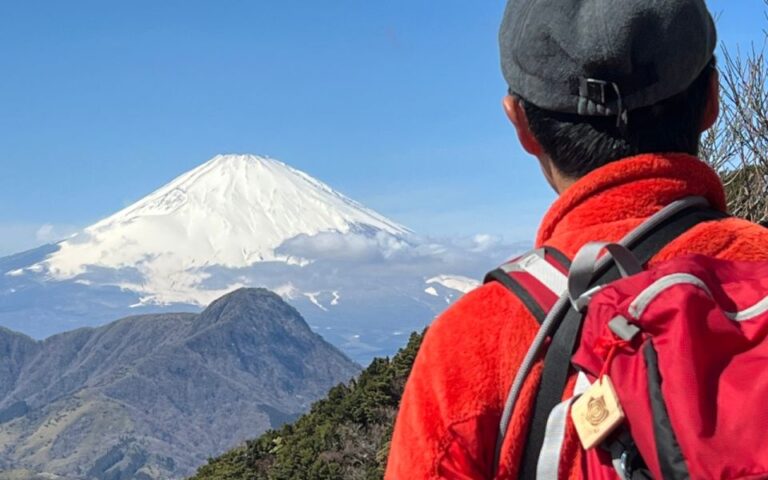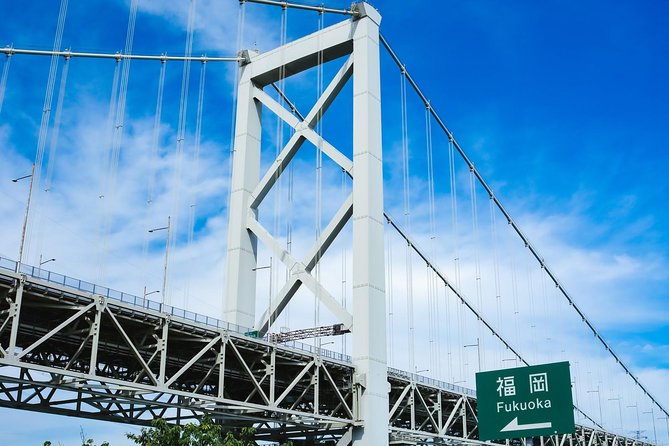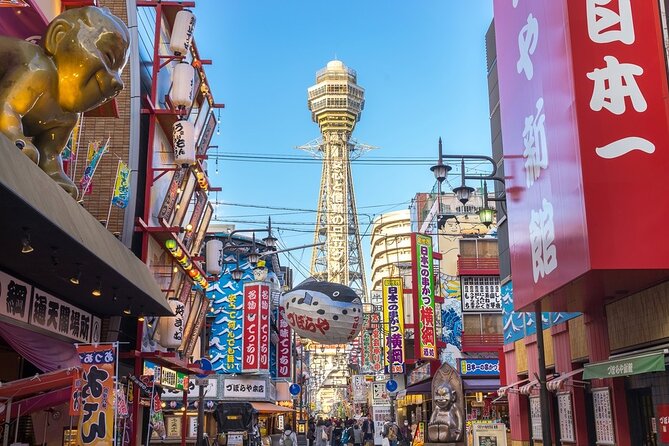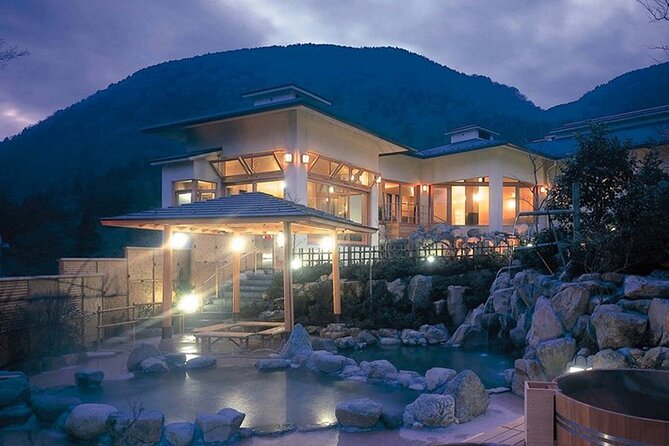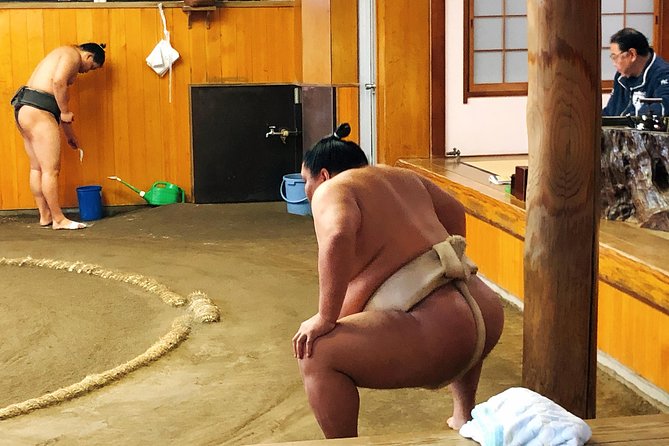Strolling through Asakusa is akin to peeling back the layers of a time-worn scroll, each step revealing a new chapter in Tokyo’s intricate history. The cobblestone paths whisper stories of samurais and geishas, blending seamlessly with the modern energy pulsating through the district.
As visitors meander past traditional tea houses and intricate wooden facades, they are transported to a realm where the past converges with the present, offering a glimpse into a world where tradition and innovation coexist harmoniously. The allure of Asakusa’s 1400-year history beckons curious minds to uncover the hidden gems nestled within its ancient streets, promising a journey through time like no other.
Just The Basics
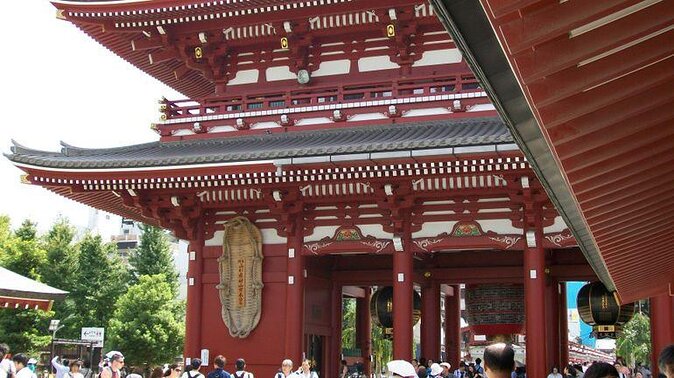
- Explore Asakusa’s 1400-year history with insightful commentary.
- Explore iconic landmarks, cultural traditions, and significant events.
- Enjoy educational and engaging experiences with knowledgeable guides.
- Immerse in the rich heritage and craftsmanship of historical Asakusa.
Tour Duration and Focus
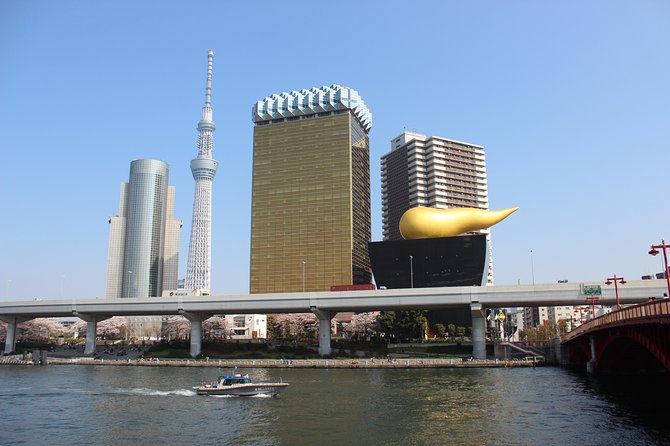
Exploring the 3.5-hour tour of Asakusa delves deep into the intricate history and cultural heritage of this fascinating district in Tokyo. Participants can expect an in-depth exploration of Asakusa’s historical insights, uncovering the rich tapestry of the area’s past.
The tour is carefully designed to provide a comprehensive understanding of Asakusa’s evolution over the centuries, offering a detailed look at the significant events and cultural influences that have shaped the district. Visitors will have the opportunity to gain valuable knowledge about the historical significance of key landmarks and traditions in Asakusa, enhancing their appreciation for this vibrant and storied neighborhood.
The tour ensures a thorough and enriching experience for those seeking to enjoy Asakusa’s captivating history.
Customer Feedback and Reviews
With glowing praise from satisfied participants, the customer feedback and reviews for the Asakusa tour highlight the guide’s exceptional knowledge and friendly demeanor. Visitors appreciate the guide’s in-depth knowledge of Asakusa’s history, making the tour educational and engaging.
The guide’s friendly approach creates a welcoming atmosphere, enhancing the overall experience for guests. Plus, many reviewers mention the guide’s helpful snack recommendations, adding a delightful culinary aspect to the tour.
These positive comments emphasize the guide’s expertise and personable nature, making the Asakusa tour a highly recommended experience.
Handling Negative Feedback Professionally
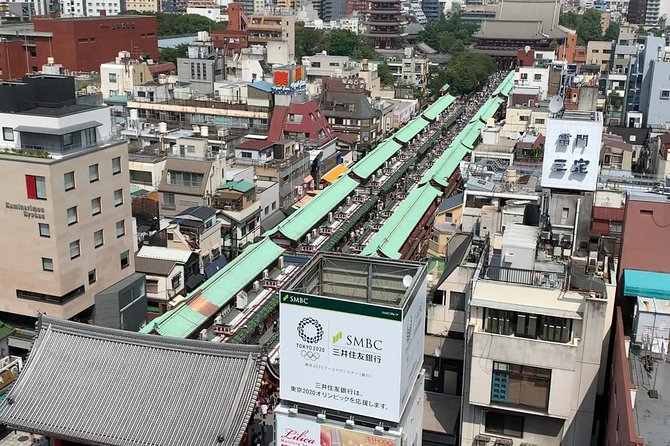
Handling negative feedback professionally involves acknowledging the issue, addressing it promptly, and implementing necessary improvements to ensure customer satisfaction. A professional response to negative feedback demonstrates care for the customer’s experience.
By apologizing for any unsatisfactory encounters and taking concrete steps like retraining staff or making policy changes, businesses show their commitment to guest satisfaction. Emphasizing safety and quality can reassure customers and rebuild their trust in the service provided.
Explaining the popularity of the destination, like Asakusa’s rich history, can also help put the feedback in context. Ultimately, handling negative feedback in a professional manner not only resolves immediate issues but also showcases a dedication to continuous improvement and customer-centric service.
Key Attractions in Asakusa
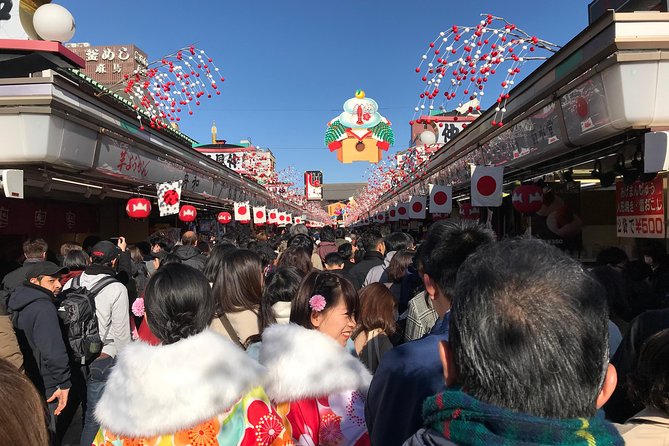
Amidst the vibrant streets of Asakusa stands the renowned Senso-ji Temple, boasting a rich history spanning 1400 years. Visitors flock to this historic site for a glimpse of ancient Japan and the following attractions:
-
Food vendors: Indulge in traditional Japanese snacks like freshly made senbei rice crackers and sweet red bean-filled imagawayaki.
-
Shopping experience: Explore Nakamise Shopping Street for unique souvenirs ranging from colorful kimonos to delicate porcelain.
-
Cultural performances: Witness captivating traditional performances like the Thunder Gate’s Kaminarimon and the beautiful Asakusa Shrine.
-
Historical architecture: Admire the intricate details of the main hall and pagoda, showcasing stunning craftsmanship and design.
These attractions offer a blend of history, culture, and modernity, making Asakusa a must-visit destination in Tokyo.
Viator Tour Information
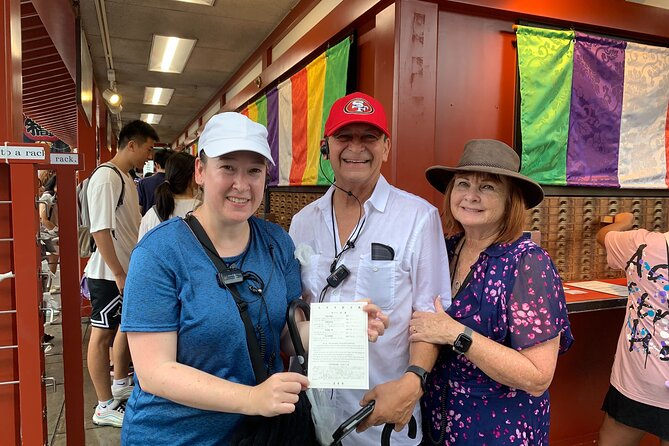
Discover essential details about the Viator tour of Asakusa, including pricing, duration, and the established history of Viator
Viator tours offer a 3.5-hour exploration of the in-depth history of Asakusa, focusing on its cultural significance. The tour provides insightful commentary, ensuring a comprehensive experience. Pricing for the tour starts from A$124.98, with variations based on group size.
Customers can easily book this tour through Viator’s user-friendly booking options. Viator, a reputable tour company established in 1997, ensures a seamless booking process and high-quality experiences for travelers. With clear terms & conditions and detailed information on how Viator works, travelers can confidently choose this tour to explore Asakusa’s rich history.
Historical Significance of Senso-ji Temple
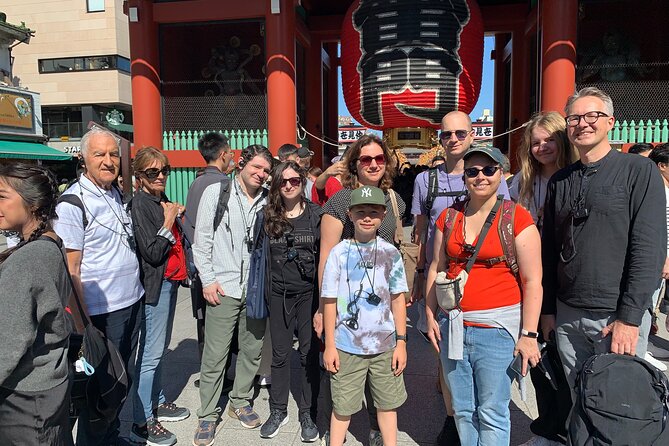
The historical significance of Senso-ji Temple in Asakusa shines through its enduring legacy that spans over 1400 years, captivating visitors with its rich cultural heritage and resilience.
-
Senso-ji Temple Architecture: The intricate details of the temple’s design showcase a blend of traditional Japanese architectural styles, reflecting a deep-rooted history.
-
Asakusa Traditional Festivals: The temple is a focal point for traditional festivals like Sanja Matsuri, where locals and travelers come together to celebrate with vibrant processions and performances.
-
Cultural Symbol: Senso-ji serves as a symbol of Asakusa’s cultural identity, preserving ancient rituals and customs that have been passed down through generations.
-
Enduring Spirit: Despite facing destruction multiple times, the temple’s reconstruction and continuous presence highlight the resilience and unwavering spirit of Senso-ji.
Exploring Asakusa’s Unique Culture
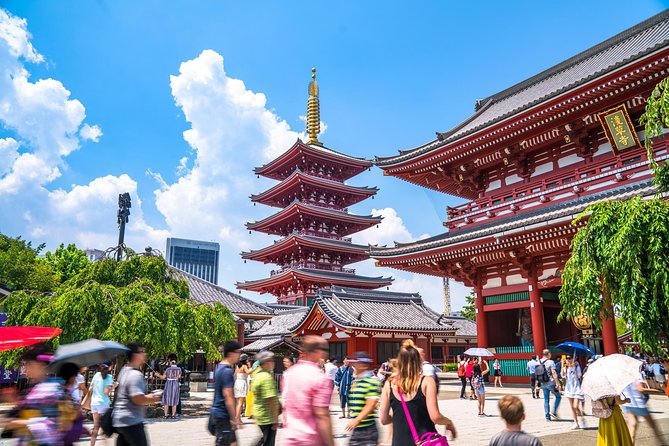
Senso-ji Temple’s profound influence extends beyond architecture, playing a pivotal role in shaping Asakusa’s distinctive cultural tapestry. Asakusa’s unique culture is a blend of traditional practices and vibrant local cuisine, making it a must-visit destination for those seeking an authentic Japanese experience. The streets surrounding the temple are lined with shops offering traditional crafts and souvenirs, while food vendors tempt visitors with local delicacies like savory Senbei crackers and sweet melon pan. To fully take in Asakusa’s culture, participating in traditional tea ceremonies or trying on a kimono can provide a deeper appreciation for the area’s rich heritage. This fusion of age-old customs and flavorful dishes truly encapsulates the essence of Asakusa’s charm.
| Traditional practices | Local cuisine |
|---|---|
| Tea ceremonies | Senbei crackers |
| Kimono wearing | Melon pan |
Common questions
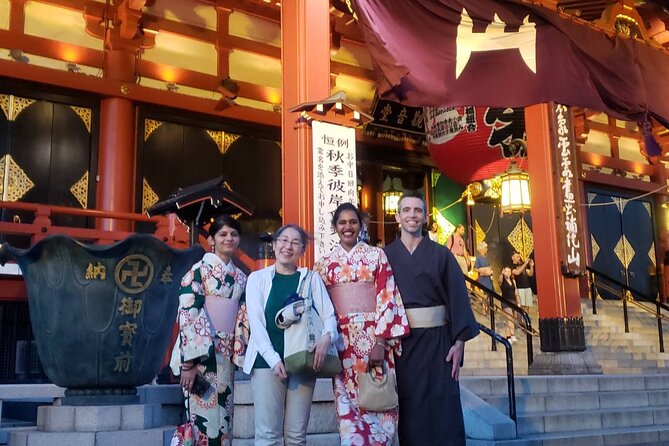
Can Visitors Participate in Any Traditional Rituals or Ceremonies at Senso-Ji Temple During the Tour?
Visitors can engage in various traditional ceremonies and interactive activities at Senso-ji Temple during the tour. Participation options include cultural experiences like making offerings, receiving blessings, and interacting with temple staff to enhance their visit.
Are There Any Restrictions or Guidelines for Photography and Filming at Asakusa’s Historical Sites?
In Asakusa, visitors should adhere to photography rules and cultural etiquette to respect historical preservation efforts. Filming restrictions may apply to certain sites. It’s essential to appreciate the significance of these guidelines to maintain the integrity of Asakusa’s historical sites.
The tour guide in Asakusa might share hidden stories of cultural traditions and untold tales about architectural marvels. Visitors can expect to explore lesser-known historical facts and anecdotes during the exploration.
How Does the Tour Accommodate Individuals With Mobility Issues or Disabilities While Exploring the Area?
The tour provides accessibility accommodations for individuals with mobility issues or disabilities to ensure everyone can enjoy cultural experiences in Asakusa. Guides assist with tailored support, making historical exploration inclusive and memorable.
Are There Any Local Legends or Myths Associated With the Landmarks in Asakusa That Will Be Discussed During the Tour?
Local legends and historical myths about Asakusa’s landmarks are shared during the tour. The guide delves into the cultural significance, traditional rituals, and hidden anecdotes tied to these sites. Accessibility accommodations ensure everyone enjoys this exploration.
Last Words
Set out on a journey through Asakusa’s 1400-year history to uncover its rich culture and traditions. From the iconic Senso-ji Temple to the bustling shopping streets, Asakusa offers a glimpse into Japan’s vibrant past and present.
With a focus on historical insights and local anecdotes, visitors can enjoy the enchanting tapestry of stories and landmarks that make this district a must-visit destination. Experience the resilience and beauty of Asakusa like never before.


